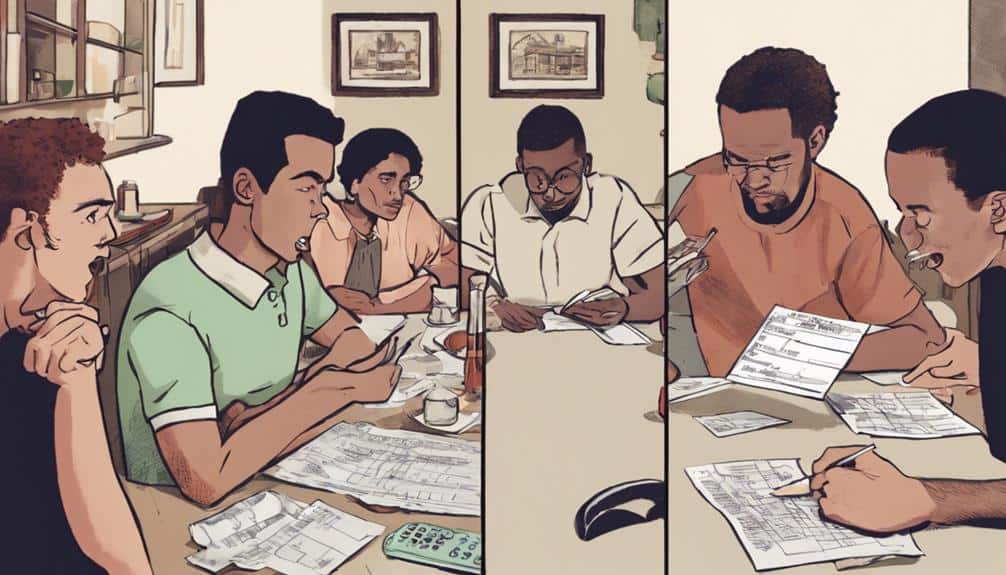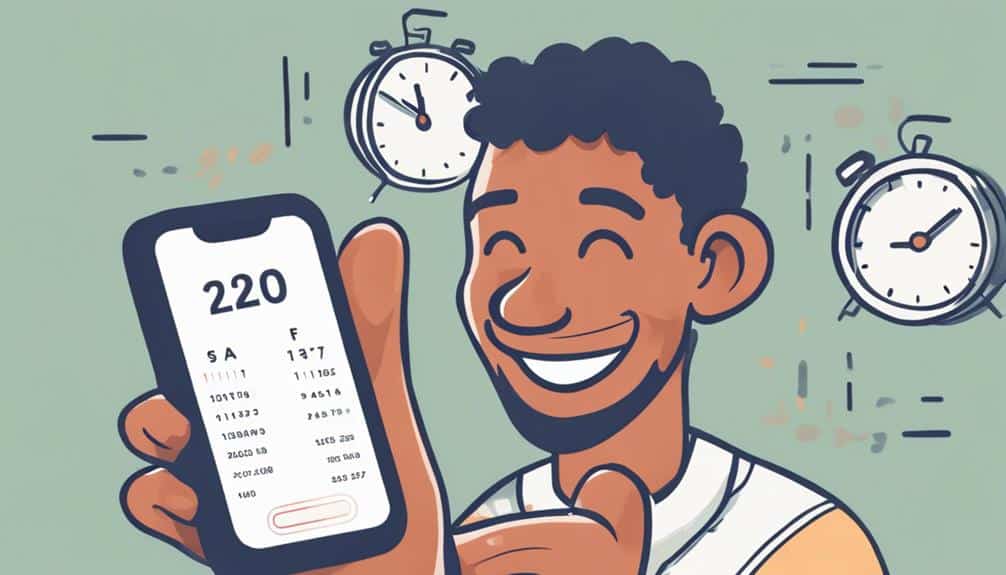When hosting a casual gathering, you want to make sure your guests know they're responsible for covering their own expenses. To politely communicate this, use direct yet polite language, stating 'NO HOST' on the invitation and clearly outlining payment details upfront. You can also inject humor into your messaging to make it more approachable. Remember to set clear expectations and provide advance information for budgeting, so your guests know exactly what to expect. By being transparent and considerate, you'll create a respectful atmosphere and avoid any misunderstandings – and with these guidelines, you'll be well on your way to hosting a stress-free event.
Key Takeaways
• Clearly state "NO HOST" on the invitation to set the tone for individual financial responsibility.
• Specify that each guest is responsible for their own expenses to avoid ambiguity.
• Use polite but direct language to communicate payment expectations, such as "Each person covers their own meal costs."
• Set clear expectations upfront to prevent misunderstandings and ensure a smooth experience for all guests.
• Inject humor to lighten the tone, e.g., "Please don't expect a free lunch – we're going Dutch!"
Framing the NO HOST Event
When hosting a NO HOST event, you establish the tone for a casual gathering where everyone pays their own way by clearly labeling the event in this manner on the invitation. This upfront approach eliminates any confusion and guarantees that guests understand the arrangement.
By specifying that guests are responsible for paying for their own meals, you're being direct yet polite in your communication. It's crucial to provide payment details upfront to avoid any awkwardness or misunderstandings. You can include a simple statement on the invitation, such as 'Please note that this is a NO HOST event, and each guest will be responsible for their own meal expenses.' This clear language sets the expectation and avoids any confusion.
Framing the event as a casual gathering helps to reinforce the idea that attendees will handle their own meal costs. This approach also helps to shift the focus from a formal, hosted event to a more relaxed, social gathering. By being transparent and direct, you're showing respect for your guests' time and wallets.
Direct yet Polite Language

When communicating with your guests, it's essential that you're clear and direct about who's paying for what. You want to be respectful and considerate, but also firm in your message, making certain that everyone understands they're responsible for their own meal expenses.
Clear Communication
To guarantee a smooth and respectful gathering, clearly communicate to your guests that they will be responsible for covering their own meal expenses. Let them know in advance that they'll need to make their own payment arrangements, so they can plan accordingly. Make it clear that each person is responsible for paying for their own meal, avoiding any confusion or misunderstandings.
| Clear Communication Tips | Example Phrases |
|---|---|
| Be direct and explicit | 'Please note that each guest is responsible for paying for their own meal.' |
| Avoid ambiguity | 'We kindly ask that each attendee covers their own meal expenses.' |
| Provide straightforward instructions | 'To ensure a smooth experience, please plan to pay for your own meal.' |
| Use tactful wording | 'We appreciate your understanding that each person is responsible for their own dining expenses.' |
Be Direct and Honest
You can set the tone for a respectful and considerate gathering by using direct yet polite language to inform your guests about the pay-your-own-way arrangement. By being clear and honest, you can avoid any misunderstandings and guarantee that everyone is on the same page.
Here are some tips to help you communicate effectively:
- Clearly communicate to your guests that they're responsible for covering their own expenses.
- Avoid ambiguity by stating upfront that attendees will need to pay for their own meals.
- Provide specific details on payment expectations to prevent any misunderstandings.
- Use straightforward wording to politely convey the need for guests to handle their own costs.
- Be direct and honest in your communication to guarantee that everyone is aware of the arrangements.
Respectful but Firm
Using direct yet polite language helps to establish a clear understanding of the pay-your-own-way arrangement, ensuring a respectful and considerate gathering for all attendees. When you invite people to a meal, it's essential to communicate the payment terms clearly. You can do this by using phrases that are both polite and firm.
| Polite Phrases | Firm Messages |
|---|---|
| Each participant will bear the cost of their dining | You're expected to pay for your meal |
| Guests are responsible for paying for their meals | Don't expect others to split the bill |
| Please plan to settle your own meal costs | Make sure to bring enough cash for a small lunch |
| Attendees are kindly advised to provide for their meal | We will each pay for our individual orders |
Casual Gathering Etiquette

When attending casual gatherings, it's important to understand that each person is typically responsible for covering their own expenses. This helps to prevent any awkwardness or misunderstandings that can arise when it comes to settling the bill.
At informal gatherings, it's common for guests to pay for their own meals or split the bill evenly. This approach, often referred to as 'going Dutch,' guarantees that each person is only responsible for their own dinner expenses. This way, you can enjoy the company of friends and acquaintances without worrying about who owes what.
Here are some key takeaways to keep in mind for casual gathering etiquette:
- Be prepared to pay for your own meal or drink when attending informal gatherings.
- It's okay to suggest splitting the bill or going Dutch to make things simpler.
- If you invite others to join you for dinner, it's polite to clarify who'll be responsible for the bill beforehand.
- Be respectful of others' budgets and financial constraints when planning casual get-togethers.
- Remember, it's always better to communicate openly and honestly about expenses to avoid any misunderstandings.
Meal Arrangements Clarified

To guarantee any confusion or awkwardness, clearly state the meal arrangement on the invitation by specifying that each guest will be responsible for covering their own dining expenses. This way, you let people know upfront what to expect, and they can plan accordingly. You can phrase it politely by saying, 'Each participant will bear the cost of their dining' or 'Please note that meals will be on a pay-your-own-way basis.' This approach sets the tone for a respectful and considerate gathering.
By providing this information in advance, you're giving your guests the opportunity to budget and prepare for the cost of their meal. This way, they'll know exactly what they need to pay and can avoid any unexpected expenses. It's crucial to be direct and clear about the arrangement to avoid any misunderstandings.
When you're clear about the meal arrangement, you're showing your guests that you respect their time and resources. You're letting them know that you value their presence and want to make sure they're comfortable with the arrangement. By being upfront about the cost, you're building trust and setting a positive tone for the gathering.
Friendly Payment Reminders

As you prepare for your pay-your-own-way gathering, don't forget to send out friendly payment reminders to your guests.
You'll want to gently encourage them to settle their individual orders and split the bill accordingly.
Split the Bill
You can effortlessly set the tone for a stress-free dining experience by politely reminding your guests to pay their own way with friendly phrases that encourage them to chip in. When hosting a family dinner or inviting someone to join you, it's essential to clearly communicate that attendees are responsible for covering their meal costs.
A simple 'Let's split the bill' or 'Don't forget your wallets' can go a long way in avoiding any misunderstandings.
Here are some friendly reminders to help your guests remember to pay their way:
- 'Just a heads up, we'll be splitting the bill tonight, so please bring your wallets!'
- 'We're all about sharing laughs, not bills!'
- 'To make things easy, let's just take care of our own meals, okay?'
- 'Please don't forget to bring some cash for dinner – we're all paying our own way!'
- 'Let's make it easy and just split the bill evenly, sound good?'
Settle Up Now
Now that you've set the tone for a stress-free dining experience, it's time to follow up with gentle reminders to settle the bill. As you near the end of your meal, casually let your guests know it's time to take care of their tabs.
You can say, 'Don't forget your wallets, as we'll be paying our own way!' or 'Let's chip in for our own meals.' This approach makes it clear that each person is responsible for their own cost per plate.
To avoid any confusion, you can also tell people, 'Please plan to settle your own meal costs' or 'We will each pay for our individual orders.' This way, everyone knows what's expected of them.
Humorous Expense Expectations

To set the tone for a fun and respectful gathering, try injecting a dash of humor into your invitation's expense expectations, making it clear that each guest is responsible for their own meal costs. This approach will help your family and friends understand the arrangement in a lighthearted way. By doing so, you can join us for dinner without the financial burden on the host.
Here are some ideas to get you started:
- 'Celebrate with us, but don't celebrate our bank account – each person is responsible for their own meal costs.'
- 'We're excited to share a meal together, but please bring your wallet, too!'
- 'Join us for dinner, and don't worry – we won't make you eat bread and water to save costs.'
- 'Let's feast together, and please, don't be shy about treating yourself – literally, you'll need to treat yourself!'
- 'Less formal, more fun! And by 'less formal,' we mean you're paying for your own meal.'
Tactful Expense Explanations

By clearly stating your expectations, you can tactfully convey to your guests that they'll be responsible for covering their meal expenses. This approach guarantees that there are no misunderstandings and that your guests are aware of their financial obligations.
To achieve this, use polite language that's direct yet courteous. For instance, you could say, 'We kindly request attendees to cover their meal expenses' or 'Each participant will bear the cost of their dining.' This type of language sets the tone for a respectful and considerate atmosphere.
When explaining the expense arrangement, it's crucial to emphasize that guests are expected to pay for their meals. You can do this by stating, 'Please note that guests will need to settle their own meal costs.' This phrase is clear and concise, leaving no room for misinterpretation.
Remember to maintain a friendly and respectful tone throughout the communication. By doing so, you'll avoid any confusion and ensure that your guests are comfortable with the arrangement.
Setting Clear Expectations

You can avoid misunderstandings and guarantee a smooth experience for everyone involved by setting clear expectations upfront. When it comes to communicating with your guests about payment, it's crucial to be direct and polite. Clearly communicate to your guests in advance that they're responsible for covering their own meal expenses. This will prevent any confusion or discomfort during the event.
Here are some key points to keep in mind when setting clear expectations:
- Clearly communicate to guests in advance that they're responsible for covering their own meal expenses.
- Use direct but polite language to inform guests that they'll need to pay for their meals.
- Provide information on the payment arrangement, such as each guest settling their own bill.
- Avoid ambiguity by explicitly stating that attendees are expected to pay for their meals.
- Set the expectation early on to prevent any misunderstandings or discomfort during the event.
Can Politely Saying “Pay Your Own Way” Come Across as Reassuring to Someone?
When expressing the need for someone to “pay your own way,” it can actually be reassuring to them. By setting boundaries and being clear about financial responsibilities, it can eliminate any uncertainty or confusion. This can ultimately have the effect of calming someone’s nerves and promoting a sense of fairness.
Frequently Asked Questions
How Do You Politely Say You Pay for Your Own Meal?
When dining with others, you want to clarify who's paying the bill. To avoid awkwardness, simply state, 'Let's plan to settle our own meal costs' or 'We're going Dutch tonight.'
You can also say, 'Each of us will cover our own orders' to emphasize individual payment. By being upfront, you'll avoid misunderstandings and guarantee a smooth dining experience.
What Is It Called When Everyone Pays Their Own Way?
You're wondering what to call it when everyone foots their own bill? It's surprisingly not just a modern phenomenon, but rather an age-old practice with a fascinating history.
What you're referring to is called 'going Dutch' or 'Dutch treat.' This fair and square approach guarantees each person covers their own expenses, making it a popular choice for social gatherings and outings where everyone wants to split the bill.
How Do You Tell People They Have to Pay for Themselves?
When hosting an event, you'll want to clearly communicate to your guests that they'll be responsible for their own meal expenses. You can do this by stating it directly on the invitation, saying something like 'each participant will bear the cost of their dining.' This sets the expectation and avoids any confusion.
What Is the Word for Pay Your Own Way?
You're wondering what to call it when everyone pays for themselves? It's simple: it's called 'going Dutch' or a 'Dutch treat'.
You can also use phrases like 'no host' or 'each participant will bear the cost of their dining' to politely convey the payment expectation.
Don't worry about offending others – these phrases are clear and respectful, ensuring a smooth experience for all.
Conclusion
As you navigate the world of no-host events, remember that clarity is key. Just as Achilles' heel was his vulnerability, unclear expectations can be the Achilles' weakness of social gatherings.
By being direct yet polite, you can prevent misunderstandings and guarantee a harmonious experience for all.
So, take a cue from the ancient Greeks and be brave enough to say 'pay your own way' with tact and finesse, and you'll be the hero of your own social gatherings.

